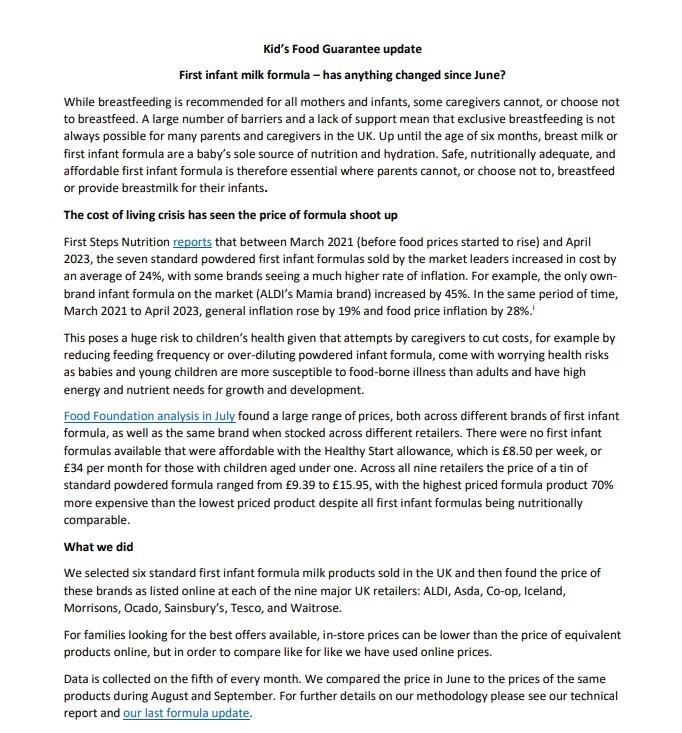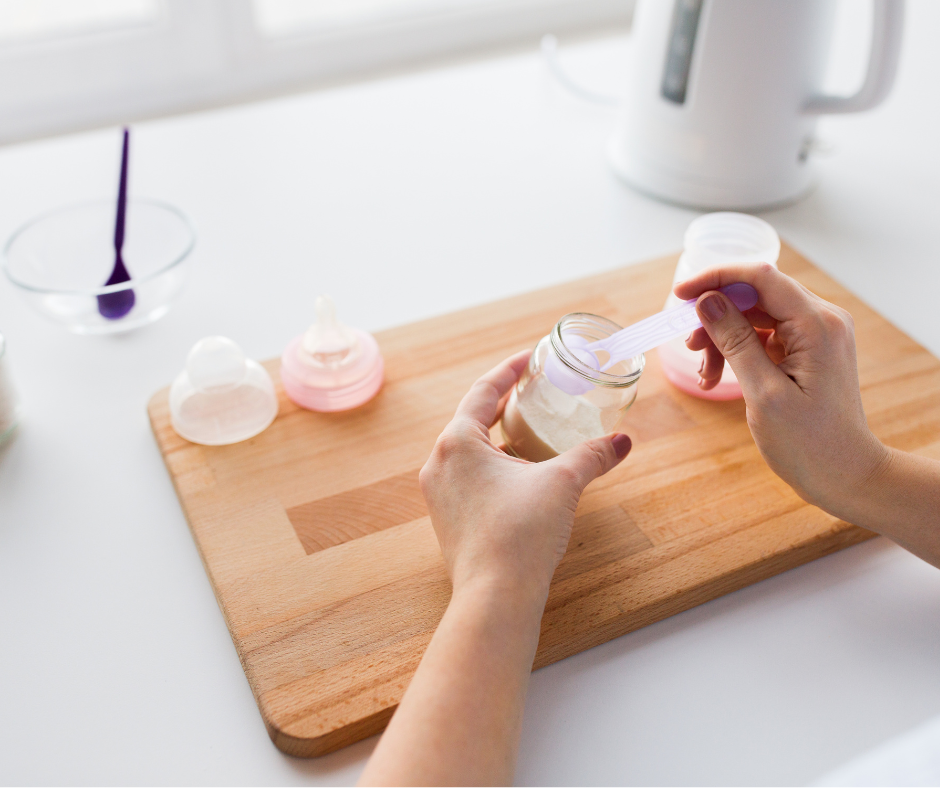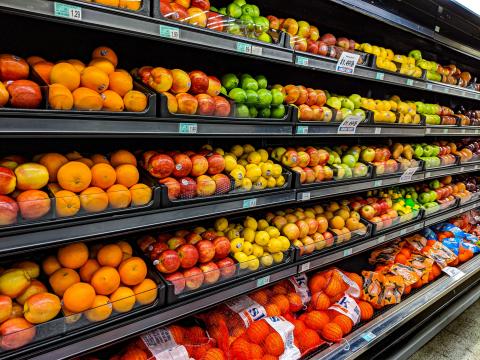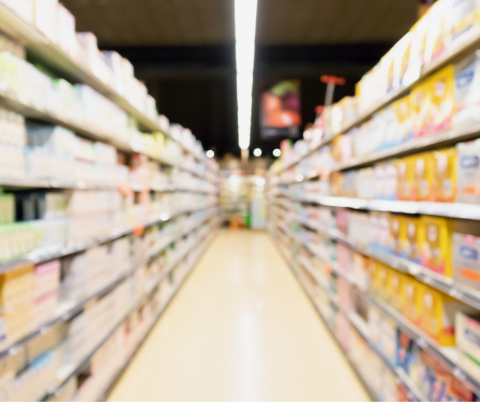
Kids Food Guarantee Update: Infant milk formula – has anything changed since June?
First infant milk formula – has anything changed since June?
While breastfeeding is recommended for all mothers and infants, some caregivers cannot, or choose not to breastfeed.
A large number of barriers and a lack of support mean that exclusive breastfeeding is not always possible for many parents and caregivers in the UK.
Up until the age of six months, breast milk or first infant formula are a baby’s sole source of nutrition and hydration.
Safe, nutritionally adequate, and affordable first infant formula is therefore essential where parents cannot, or choose not to, breastfeed or provide breastmilk for their infants.
The cost of living crisis has seen the price of formula shoot up
First Steps Nutrition reports that between March 2021 (before food prices started to rise) and April 2023, the seven standard powdered first infant formulas sold by the market leaders increased in cost by an average of 24%, with some brands seeing a much higher rate of inflation.
For example, the only own-brand infant formula on the market (ALDI’s Mamia brand) increased by 45%. In the same period of time, March 2021 to April 2023, general inflation rose by 19% and food price inflation by 28%(1).
This poses a huge risk to children’s health given that attempts by caregivers to cut costs, for example by reducing feeding frequency or over-diluting powdered infant formula, come with worrying health risks as babies and young children are more susceptible to food-borne illness than adults and have high energy and nutrient needs for growth and development.
Food Foundation analysis in July found a large range of prices, both across different brands of first infant formula, as well as the same brand when stocked across different retailers.
There were no first infant formulas available that were affordable with the Healthy Start allowance, which is £8.50 per week, or £34 per month for those with children aged under one.

Across all nine retailers the price of a tin of standard powdered formula ranged from £9.39 to £15.95, with the highest priced formula product 70% more expensive than the lowest priced product despite all first infant formulas being nutritionally comparable.
What we did
We selected six standard first infant formula milk products sold in the UK and then found the price of these brands as listed online at each of the nine major UK retailers: ALDI, Asda, Co-op, Iceland, Morrisons, Ocado, Sainsbury’s, Tesco, and Waitrose.
For families looking for the best offers available, in-store prices can be lower than the price of equivalent products online, but in order to compare like for like we have used online prices.
Data is collected on the fifth of every month. We compared the price in June to the prices of the same products during August and September. For further details on our methodology please see our technical report and our last formula update.
What we found
We found no change in the price of first infant milk formula between June and August. Food price inflation slowed from 17.4% to 13.6% during the same period of time, so the fact that first infant milk formula pricing remained stable is broadly positive.
However, in September Iceland announced that they were cutting the cost of all formula they sell to cost price, which has led to a welcome drop in the price of those first infant formula brands available at Iceland.
The only other retailer cutting the price of first infant milk formula is Sainsbury’s, where the price of SMA little Steps fell by £0.15 between June and September.
Aldi’s Mamia brand remains the most affordable standard pack size option available at £9.39 per tin although this is still higher than the amount families eligible for the Healthy Start scheme receive.
Although Co-op's September prices show no change compared to June, they have confirmed that from October 11th the price of infant formula will be the same whether customers shop in London, elsewhere in the country, or online direct from Co-op(2).
This move towards consistent pricing across all sales channels is a very positive step and one that other retailers ought to look at implementing.
The Kid’s Food Guarantee is focused on first infant milk formula, given that the NHS does not consider follow on formula as essential, recommending that first infant milk is the most suitable choice of formula up to 12 months of age.
However, in August, ASDA discounted the price of some follow on formulas as part of a package of cost of living price reductions.
Although it is welcome to see a fall in the price of formula, it is disappointing that first infant milk was not also reduced in price, with ASDA’s HiPP Organic in fact seeing an increase in price compared to June.
It is also extremely concerning to see that some first infant formula brands now cost more than the same brand equivalent follow on formula at ASDA - given that follow on formula is not recommended for babies aged under six months and the lower price may lead to caregivers purchasing follow on formula instead of infant formula.
What needs to happen
The Food Foundation's Kid’s Food Guarantee is calling for both manufacturers and retailers to insulate first infant milk formula from the worst of food price inflation. In addition, exploring the potential to offer supermarket own-brand formulas would be welcome as these typically have a lower price point than branded products.
While Iceland are to be applauded for lowering the costs of formula, they should not have attached any marketing to their discounted first infant milk formulas, and we would urge all retailers to ensure they adhere to the law on marketing of breast milk substitutes. We have written more about Iceland’s move to discount formulas here.
The Government also ought to act urgently to:
- Increase the value of the Healthy Start allowance in line with inflation. There are currently no first infant formulas that are affordable within the Healthy Start allowance, which provides funds to spend on fruit, veg, milk and formula for low income families with children aged under four in England, Wales and Northern Ireland.
- Clarify the law around the use of cash equivalents (such as catsh accrued on store cards or retailer vouchers and giftcards sometimes provided by food banks to families) to buy formula. Currently supermarkets do not accept these forms of payment for formula, which in our view is an overly cautious interpretation of the law.
Given that all first infant milk formulas are nutritionally comparable, health care professionals and retailers should also clearly communicate and signpost that there is no need for families to buy the more expensive products.
The Food Foundation's Kid’s Food Guarantee is therefore calling for retailers to offer an own brand formula and encouraging both manufacturers and retailers to insulate first infant milk formula from the worst of food price inflation.
To find more data on formula prices visit our Kids Food Guarantee dashboard.
______________________
(1) Based on Food Foundation analysis of CPI data. The ONS typically calculate inflationary change on a 12-month basis. Food price inflation has risen 13.6% in the 12 months to August 2023.
(2) Pricing at Deliveroo and Uber Eats may vary however.





